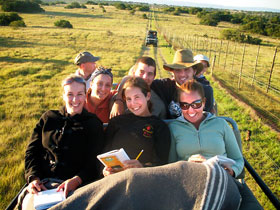  |
| HOME | THIS ISSUE | CALENDAR | GRANTS | BACK ISSUES | < BACK | NEXT > |
Honors Study Abroad immerses students in South African lifeby Sherry Fisher - March 27, 2006 |
||||
|
They are teaching people about HIV, working with the sick, and debating politics in their classes. They have talked with Nelson Mandela’s former prison mate, surfed in the Indian Ocean, and been chased by rhinos during an excursion. The 12 students in the Cape Town Honors Study Abroad Program this semester are experiencing more than they had ever imagined. “The things that I’m learning about life in general, the world, South Africa, the government, and the people, through this internship is wonderful,” says Breyonne Golding, a junior majoring in urban and community studies. “It has changed who I am.” The Cape Town program, offered for the first time this year, provides students with hands-on experience and traditional course work, says Ross Lewin, director of Study Abroad. “It creates a dialectic whereby the theory in the classroom enriches the experience in the internship, and the experience in the internship complements the theory in the classroom. It also taps into the core values of the University of Connecticut: human rights.” The program was developed by Lewin and Lynne Goodstein, associate vice provost of the Honors Program. “It’s a very focused curriculum that allows students to immerse themselves in the culture and living history of South Africa by working with prominent organizations that are part of the exciting South African project of creating a modern democracy,” Lewin says. Although students don’t need to be in the Honors Program to participate, they must demonstrate the intellectual curiosity and discipline to do honors-level work, he adds. The heart of the program is a three-day-per-week internship in a non-governmental agency involved in issues of social justice. These include the Independent Electoral Commission, Solo Mongololo, involved in Children and Women’s Rights; Black Sash, whose focus is civil rights and poverty alleviation; the South African Commission on Human Rights; and the Red Cross Children’s Hospital. Every effort is made to match students’ interests, skills, and passions, Lewin says. Goodstein says, “One of our major goals in Honors is to encourage engagement beyond the classroom, and the student participants are intensely engaged. Every day they are learning something new about this important part of the world.” Students are required to take two three-credit courses, Politics of South Africa and Natural History and Ecology of South Africa, and a research seminar. The politics course is a series of lectures that offer an overview of the social, political, and economic history of South Africa. The ecology course, taught by John Silander, a professor of ecology and evolutionary biology at UConn, integrates classroom and field work focusing on topics including climate, geology, humans and their migrations, biocultural diversity, and conservation.
The courses take place at the University of Cape Town. Silander says the program is “immensely rewarding as well as challenging. The trans-disciplinary nature of the of the program I find to be extraordinarily stimulating and exhilarating – combining science, social science, and humanities.” He provides hands-on experiences for the students, done primarily done in the field. “A significant part of that experience was an intensive nine-day field trip. The excursion took the students across the full sweep of the South African landscape represented in the Eastern and Western Cape Provinces – from Mediterranean-climate shrub lands, to rainforests, to deserts, to the savannas with many African game species,” Silander says. “The students had up-close – but safe – encounters with rhinos, elephants, lions, buffalo, antelope, birds, insects, and reptiles, and saw many plants.” Silander adds, “I have been able to weave in the social science perspective by having the students see how the landscape is used in different and often conflicting ways – accomplished via direct observation and interviews.” Tyler Lane, a senior majoring in psychology, says, visiting the townships – “where ‘the other half’ lives” – was an eye-opener. “Our experience would have been far less rich without it, and we had a great time getting a walking tour with some of the local people we met.” The best part of the program is “how much we have seen,” Lane says. “We have been to the trendy shops and nightclubs in downtown Cape Town, we’ve seen the townships of Kayelitscha and Guguletu; we have been to the top of Table Mountain, the beaches of Simon’s Town, and the deserts of the Great Karoo. Africa is a land of contrasts, and we were given a sample of those contrasts.” Jonathan Glenn, a junior majoring in biology, says Silander’s course is top notch, “probably the best class I have taken throughout my entire academic career. I find that John does a magnificent job ensuring that everyone is able to grasp the concepts put forward, regardless of one’s background in ecology or biology.” Glenn also enjoys his internship at the Red Cross Children’s Hospital, where he sees first-hand ailments he might not see if he worked at a U.S. hospital. Golding says South Africa is an amazing country. “It’s filled with physical beauty and bursting with cultural diversity,” she says. “This is my first time in Africa and, because of this trip, it won’t be the last.” |
| ADVANCE HOME UCONN HOME |

